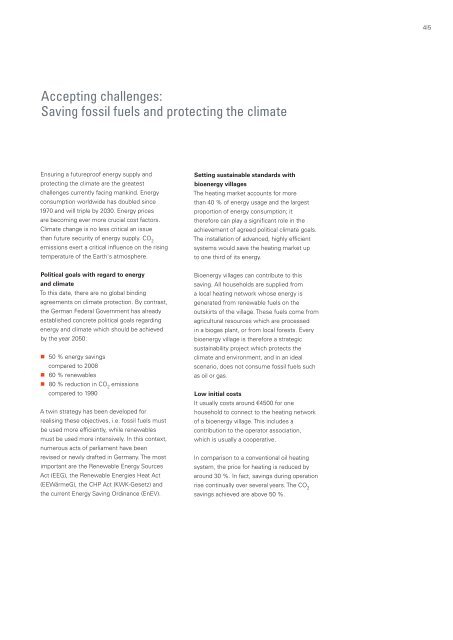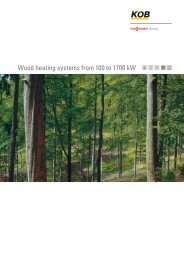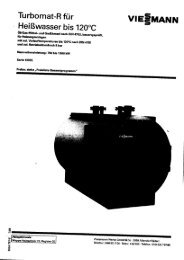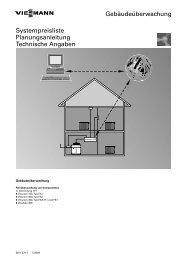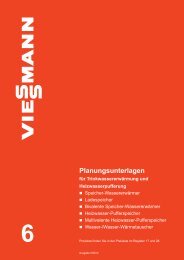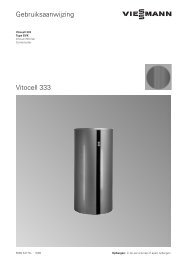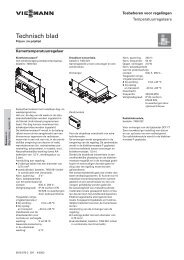The bioenergy village: Power and heat from renewables - Viessmann
The bioenergy village: Power and heat from renewables - Viessmann
The bioenergy village: Power and heat from renewables - Viessmann
- No tags were found...
You also want an ePaper? Increase the reach of your titles
YUMPU automatically turns print PDFs into web optimized ePapers that Google loves.
4l5Accepting challenges:Saving fossil fuels <strong>and</strong> protecting the climateEnsuring a futureproof energy supply <strong>and</strong>protecting the climate are the greatestchallenges currently facing mankind. Energyconsumption worldwide has doubled since1970 <strong>and</strong> will triple by 2030. Energy pricesare becoming ever more crucial cost factors.Climate change is no less critical an issuethan future security of energy supply. CO 2emissions exert a critical influence on the risingtemperature of the Earth's atmosphere.Setting sustainable st<strong>and</strong>ards with<strong>bioenergy</strong> <strong>village</strong>s<strong>The</strong> <strong>heat</strong>ing market accounts for morethan 40 % of energy usage <strong>and</strong> the largestproportion of energy consumption; ittherefore can play a significant role in theachievement of agreed political climate goals.<strong>The</strong> installation of advanced, highly efficientsystems would save the <strong>heat</strong>ing market upto one third of its energy.Political goals with regard to energy<strong>and</strong> climateTo this date, there are no global bindingagreements on climate protection. By contrast,the German Federal Government has alreadyestablished concrete political goals regardingenergy <strong>and</strong> climate which should be achievedby the year 2050: 50 % energy savingscompared to 2008 60 % <strong>renewables</strong> 80 % reduction in CO 2emissionscompared to 1990A twin strategy has been developed forrealising these objectives, i.e. fossil fuels mustbe used more efficiently, while <strong>renewables</strong>must be used more intensively. In this context,numerous acts of parliament have beenrevised or newly drafted in Germany. <strong>The</strong> mostimportant are the Renewable Energy SourcesAct (EEG), the Renewable Energies Heat Act(EEWärmeG), the CHP Act (KWK-Gesetz) <strong>and</strong>the current Energy Saving Ordinance (EnEV).Bioenergy <strong>village</strong>s can contribute to thissaving. All households are supplied <strong>from</strong>a local <strong>heat</strong>ing network whose energy isgenerated <strong>from</strong> renewable fuels on theoutskirts of the <strong>village</strong>. <strong>The</strong>se fuels come <strong>from</strong>agricultural resources which are processedin a biogas plant, or <strong>from</strong> local forests. Every<strong>bioenergy</strong> <strong>village</strong> is therefore a strategicsustainability project which protects theclimate <strong>and</strong> environment, <strong>and</strong> in an idealscenario, does not consume fossil fuels suchas oil or gas.Low initial costsIt usually costs around €4500 for onehousehold to connect to the <strong>heat</strong>ing networkof a <strong>bioenergy</strong> <strong>village</strong>. This includes acontribution to the operator association,which is usually a cooperative.In comparison to a conventional oil <strong>heat</strong>ingsystem, the price for <strong>heat</strong>ing is reduced byaround 30 %. In fact, savings during operationrise continually over several years. <strong>The</strong> CO 2savings achieved are above 50 %.


